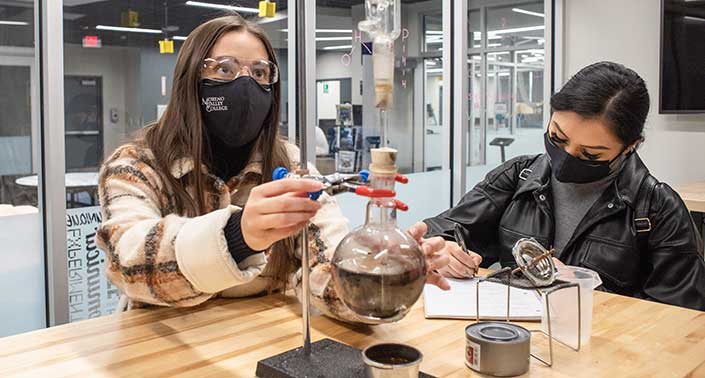MVC Awarded a $5 Million Title III Grant
10/10/2021

Moreno Valley College received a second Title III grant, the latest for $5 million. The College's winning proposal, Experiential Learning: Closing the STEM Talent Gap, will address education delivery techniques with the goal of increasing transfer opportunities for Hispanic and low-income STEM students.
Experiential learning is defined as the process of learning through experience, such as hands-on understanding. Through experiential learning the institution aims to increase the number of Hispanic and low-income students who attain degrees in STEM by utilizing the versatility of experiential learning to develop an array of applied learning options that foster student interest and enrollment, improve student success, and facilitate degree completion and transfer.
Donnell Layne, director of the STEM Innovation Center & Makerspace at MVC, said he hopes to see a 10 percent increase in enrollment in STEM courses by students underrepresented in STEM; a 60 percent increase in the number of traditional underrepresented students in STEM who will pursue degrees and careers in data science; with 75 percent of students who complete degrees in STEM participating in work-based and/or undergraduate research experiences, both paid and unpaid, prior to degree completion and/or transfer; and a 10 percent increase in course retention and success rates for students enrolled in math classes utilizing experiential learning.
“In achieving these outcomes, this project will increase the number of Hispanic and low-income students who complete STEM degrees and transfer to a university," he said.
The Experiential Learning: Closing the STEM Talent Gap will build an Outdoor Learning Laboratory and leverage the innovative use of virtual and augmented reality to tackle historically challenging classes, including math, to better engage students in the learning process, building upon their interests in gaming, simulation, and other virtual environments; and utilize MVC's on-campus Makerspace as well as the mobile Makerspace to allow staff to take applications and resources out into the community, thereby facilitating K-12 outreach and promoting student interest in STEM. These tools and skillsets will also be utilized in the Moreno Valley community to help with social issues like food injustice.
“We found that integrating meaningful hands-on classroom experiences into course curricula - such as through Makerspace activities - shows promise as a strategy through which MVC can improve student retention, and subsequently course success and program completion," Layne said.
Analytics supports Layne's idea in several academic areas.
“By applying learning concepts from computer science, mathematics, science and literature subjects, students will work collaboratively across the disciplines to gather, visualize, interpret data, document findings, and derive solutions for food insecurity in our community," Kasey Nguyen, Ph.D., associate professor, Computer Information Systems, said. “By taking the experiential learning beyond the classroom walls, students can actively apply their skills to solve problems that impact our community, which can be personally and professionally meaningful to students and faculty,"
Nguyen is one of four faculty “champions" for the grant, joining Gabriela Florido (math), Joanna Werner-Fraczek, Ph.D., (biology), and Emma Pacheco (communications) .
“I am excited for this collaborative experiential learning opportunity for my English classes because of its multidisciplinary approach and its connection to culturally relevant pedagogy," Pacheco, assistant professor, said. “In this outdoor classroom experience, students in my English class will have an opportunity to do hands-on activities that connect to the research they will do for my English class that apply to topics such as transnational foodways, oral histories, and food justice in the Inland Empire."
Experiential learning has seen significant traction in math where retention rates are constantly under pressure at nearly every level of education.
“Experimental learning allows students to work hands on with mathematical concepts learned in class and to get an understanding of real world applications," Florido said. “Technology is advancing, and teaching practices should reflect that. Students should be exposed to these technologies and ways of thinking so they can be competitive in the job market."
Despite seeing success in experiential learning outcomes, Layne said there is more to be accomplished and that is where these monies will prove beneficial.
“There is more work to be done and barriers remain to ensure student success in STEM, particularly for Hispanic and low-income students," he said. “Additional research into experiential learning in all subject fields is needed."
Because all institutions battle low enrollment and successful completion outcomes in STEM, MVC will partner with the University of California, Riverside; California State University, San Bernardino; and the University of California, Berkeley.
While student enrollment in STEM has increased over the past five years, current enrollment does not meet industry and workforce demands. In 2019, only 25 percent of all incoming students enrolled in STEM pathways. Of those enrolled in STEM, 74 percent were Hispanics and 80 percent were low-income, demonstrating an interest by student groups traditionally underrepresented in STEM. However, fall to spring persistence rates for the STEM pathways were only 56 percent.
“The project provides an opportunity for MVC students to participate in relevant and real research opportunities, and for faculty professional development to enhance and improve STEM pedagogy and teaching strategies across multiple disciplines," Werner-Fraczek said. “The project encourages participation by low-income, underrepresented, and/or minority students and who might not otherwise pursue research-based learning."
Published by External Relations & Strategic Communications

